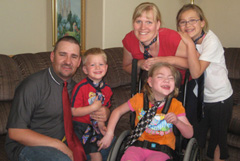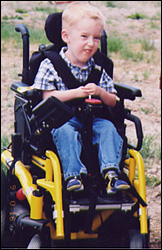A New (or Old) Diagnosis - You Are Not Alone
Understand Common Reactions
Learning about any problem in their child’s development can come as a huge concern to parents. Many parents react in some or all of these ways:
- Denial – Thoughts such as, “This cannot be happening to me, to my child, to our family” are one of the first reactions to a diagnosis.
- Anger - Denial often merges with anger, which may be aimed towards the health care provider who told you about the child’s problem. Anger can also create problems between spouses, with grandparents, or with others in the family.
- Fear – Parents often feel afraid of the unknown in facing their child’s diagnosis.
- Guilt – Parents may worry over whether they are somehow at fault for the problem: “Did I do something to cause this? Am I being punished for something I have done? Did I take care of myself when I was pregnant?” Much self-blame and sadness can stem from questioning the causes of the diagnosis.
- Confusion – In the midst of shock, facts can seem garbled and distorted. A diagnosis often comes with new words and unfamiliar terms that make it hard to fully grasp what is happening. This confusion may lead to sleeplessness, not being able to make decisions, and mental overload.
- Powerlessness – Many parents have a hard time accepting their child’s diagnosis. The inability to change what is happening, along with the need to feel able to handle daily life can lead to feelings of powerlessness.
- Disappointment – A child’s diagnosis may pose a threat to many parents’ egos and a test to their value system. This jolt to past expectations can make it hard to see one’s child as a valued, growing person.
- Rejection – While feelings of rejection are sometimes directed toward the child, they may also be toward health care providers or toward other family members.
Seek the Support of Another Parent
Talk with Your Spouse and Family
It is of great value for parents to talk about their feelings in regard to their child’s diagnosis. The more couples can talk at times like these, the greater their shared strength. To improve communication:
- Know that you each take your roles as parents differently. How you will feel and react to this will be specific to you.
- Try to make clear to each other how you feel; try to be kind when you don’t see things the same way.
Continue Learning More and Keep Records
Asking the right questions, learning the terms, and keeping good records will help make life easier when dealing with a new diagnosis. Learning about the diagnosis and having some knowledge of the child’s future prospects can help, rather than not knowing. To make sure that you get the right information:
- If someone uses a word you don’t know, do not be afraid to ask them to make it clear to you. Asking questions will help you understand more about your child.
- Write down your questions before appointments or meetings and write down further questions as you think of them during the meeting.
- Get copies of all records (such as evaluations, diagnostic reports, and progress reports) from physicians, teachers, and therapists.
- Put together a notebook of all information that is given to
you. (For printable pages, see the Care Notebook page)
- If you do not have a notebook, find a box or drawer to use just for that, then when you need it, you’ll know where it is.
- Keep all of the information you collect in a safe place, so you have it if you need it.
Decide How to Deal with Others
During this period, parents may feel sad or angry about the way people are reacting to their child. Many people’s reactions to problems are caused by a lack of understanding, simply not knowing what to say, or fear of the unknown. To cope with others’ reactions:
- Understand that many people don’t know how to act when they see a child with disabilities, and may not seem kind.
- Try not to focus on people who are unable to respond to your child in ways you might prefer.
Remember that This is Your Child
It is vital to keep in mind that your child comes first; their diagnosis comes second. To keep the focus on your child:
- Know that although your child's progress may be different from that of other children, this does not make your child less valued, less human, less worthy, or in less need of your love and parenting.
- Love and enjoy your child.
Try to relax and take the steps outlined in this article. By taking things one step at a time, you will do the best you can, you'll help your child, and you can look to the future with hope.
*This content has been adapted from You Are Not Alone: For Parents When They Learn That Their Child Has a Disability, by Patricia McGill Smith, Executive Director, National Parent Network on Disabilities. To read the complete article, contact the Utah Parent Center or go to You Are Not Alone (McGill Smith).
Resources
Information & Support
For Parents and Patients
Center for Parent Information and Resources (DOE)
Parent Centers in every state provide training to parents of children with disabilities and provide information about special
education, transition to adulthood, health care, support groups, local conferences, and other federal, state, and local services.
See the "Find Your Parent Center Link" to find the parent center in your state.
Services for Patients & Families in Nevada (NV)
| Service Categories | # of providers* in: | NV | NW | Other states (3) (show) | | NM | RI | UT |
|---|---|---|---|---|---|---|---|---|
| Family Support Services | 66 | 13 | 23 | 45 | 31 | |||
| Local Support Groups, General | 39 | 2 | 9 | 8 | 63 | |||
| National Support Services, Disab/Diag | 117 | 117 | 117 | 117 | 118 | |||
For services not listed above, browse our Services categories or search our database.
* number of provider listings may vary by how states categorize services, whether providers are listed by organization or individual, how services are organized in the state, and other factors; Nationwide (NW) providers are generally limited to web-based services, provider locator services, and organizations that serve children from across the nation.
Authors & Reviewers
| Authors: | Chuck Norlin, MD |
| Robin Pratt |


 Get More Help in Nevada
Get More Help in Nevada
